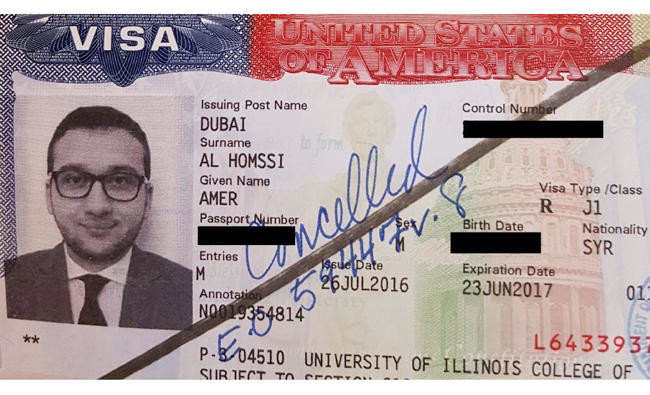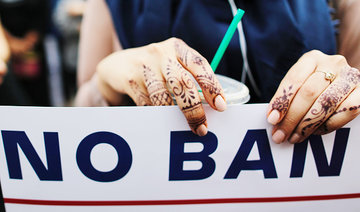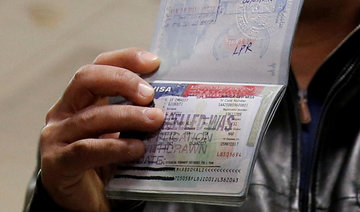BALTIMORE: A coalition of Muslim and Iranian-American advocates and a nonpartisan legal institute filed the first lawsuits against the Trump administration’s new travel restrictions for citizens of eight countries, including Iran, that were announced late last month.
The lawsuits were filed Monday in federal courts in New York and Maryland.
The Trump administration in September announced the most recent restrictions, which affect citizens of Chad, Iran, Libya, North Korea, Somalia, Syria, and Yemen — and some Venezuelan government officials and their families. They are to go into effect Oct. 18.
One lawsuit, filed Monday night in US District Court for the Southern District of Maryland on behalf of the Iranian Alliance Across Borders and six individuals, argues that restricting travel for citizens of predominantly Muslim countries violates the US Constitution.
“Iranian Americans, and other affected communities, have had to familiarize themselves with ambiguous new laws and policies every few months because of this president’s obsession with fulfilling a flawed campaign promise to ban Muslims from the United States. This erosion of fundamental American values must stop,” said Shayan Modarres, legal counsel for the National Iranian American Council, one of the groups that filed the lawsuit.
A second suit, filed hours earlier in the US District Court for the Southern District of New York on behalf of the Brennan Center for Justice at New York University, seeks to compel the State Department to comply with a Freedom of Information Act request and turn over documents submitted to the White House by the Department of Homeland Security detailing the information-sharing practices of foreign countries and justifying the decision to exclude travelers from select countries.
The US Department of Justice did not immediately respond to a request for comment Monday. The White House referred questions to the State Department, which declined to comment on ongoing litigation.
President Donald Trump on Sept. 24 issued a proclamation outlining the new travel restrictions. Administration officials said the latest version is the result of a lengthy process, based on an objective assessment of each country’s security situation and willingness to share information with the US
It was the administration’s third measure to limit travel after a broad ban that sparked chaos at US airports in January and numerous challenges in courts across the country. The administration later issued a temporary order after suffering legal setbacks on the earlier attempt at restrictions.
The Iranian Alliance Across Borders lawsuit is filed against Trump, acting Secretary of Homeland Security Elaine Duke, acting Commissioner of US Customs and Border Protection Kevin McAleenan, acting Director of US Citizenship and Immigration Services James McCament, Attorney General Jeff Sessions and Secretary of State Rex Tillerson.
The suit argues that simply adding two countries that are not majority-Muslim to the list is only “an effort to disguise the Proclamation’s targeting of Muslims.” Such discrimination violates the First Amendment and the Immigration and Nationality Act, the suit says. The group is asking for a nationwide injunction to stop the restrictions from going into effect.
“Despite President Trump’s attempts to cloak this latest iteration of his Muslim ban in religiously neutral garb by invoking a national security review and including North Korea and Venezuela, the purpose and effect of the Proclamation remain unchanged: to keep Muslims from entering the United States.”
The prior ban included Sudan but didn’t include Chad, North Korea or Venezuela. The new measures range from an indefinite ban on visas for citizens of Syria to more targeted limitations. Iranians, for example, will not be eligible for immigrant, tourism or business visas but remain eligible for student and cultural exchange visas if they undergo additional scrutiny.
Johnathan Smith, legal director for Muslim Advocates, an organization representing the plaintiffs in both lawsuits, said the complaints take issue with both the impact of the travel restrictions and the process by which they were developed.
“You can’t ignore the fact that this ban affects heavily Muslim countries, and the fact that they attempt to obscure that bias by adding two countries — North Korea and Venezuela — that don’t have a Muslim majority doesn’t negate the fact that at its core, this policy is about blocking entry of Muslim individuals into the United States,” Smith said. “In addition to the challenge of constitutionality to the program, it’s equally important to bring some transparency, some light, some sunshine to these processes so all Americans can see what’s happening and make their own judgments and assessments about what the White House and federal agencies are doing.”
The American Civil Liberties Union (ACLU) and other groups previously sued the administration over its original travel ban on visitors from six majority-Muslim countries. Last week, the ACLU announced that it planned to amend its existing lawsuit to include the latest restrictions, and seek to stop the suspension of visas and other entry restrictions. Justice Department spokesman Ian Prior said in an e-mail Friday that the agency “will continue to vigorously defend the President’s inherent authority to keep this country safe.”
Travel ban lawsuits filed by legal center, Muslim advocates
Travel ban lawsuits filed by legal center, Muslim advocates

Nomination of Jordanian American as US surgeon general withdrawn over credentials controversy

CHICAGO: US President Donald Trump on Wednesday withdrew the nomination of Jordanian-American physician Janette Nesheiwat, a FOX TV medical contributor, to serve as the nation’s surgeon general after critics alleged she falsified parts of her medical resume.
In announcing his intention to nominate Nesheiwat in a release on Nov. 22, 2024, then President-elect Trump had said: “Dr. Nesheiwat is a double board-certified Medical Doctor with an unwavering commitment to saving and treating thousands of American lives.”
He added that she was a “proud graduate of the University of Arkansas for Medical Sciences” and that her “journey began with humble roots as one of five children raised by a widowed immigrant mother who worked as a nurse.”
https://www.presidency.ucsb.edu/documents/statement-president-elect-donald-j-trump-announcing-the-nomination-dr-janette-nesheiwat
The information is reflected on her website at DrJanette.net, which states: “Dr. Nesheiwat completed her medical residency at University of Arkansas for Medical Sciences, UAMS.”
https://www.drjanette.net/about-1
But records published by several media houses claim that Nesheiwat actually earned her medical degree from the American University of the CaribbeanSchool of Medicine, located in St. Maarten, in the Caribbean.
https://www.cbsnews.com/news/trump-surgeon-general-nominee-dr-janette-nesheiwat-credentials/
Critics charge that Nesheiwat was never a student at the University of Arkansas for Medical Sciences.
https://lastcampaign.substack.com/p/trumps-surgeon-general-pick-distorted
Nesheiwat, whose parents are Christian-Arab immigrants from Amman, Jordan, was to appear before the US Senate Committee on Health, Education, Labor and Pensions on Thursday, May 8, 2025, to testify on her nomination before being confirmed.
But her appearance was removed from the announcement on Wednesday afternoon.
The US surgeon general oversees the US Public Health Service Commissioned Corps, an elite group of over 6,000 uniformed officers who are public health professionals.
The USPHS mission is to protect, promote, and advance the health of the nation.
https://www.hhs.gov/surgeongeneral/index.html#:~:text=The%20Surgeon%20General%20oversees%20the,the%20health%20of%20our%20nation.
Nesheiwat came under further scrutiny after conservative activist and Trump confidant Laura Loomer posted the allegations on Monday on X.
Loomer stated that “we can’t have a pro-COVID vaccine nepo appointee who is currently embroiled in a medical malpractice case and who didn’t go to medical school in the US as the US Surgeon General.”
“She is now being accused of lying about her credentials,” added Loomer.
https://x.com/LauraLoomer/status/1919180558355013817
On X, Loomer has described the COVID-19 vaccinations as “dangerous.”
She added: “Vaccines Cause Autism. Even Donald Trump knows this. That’s why he has directed his new admin and his HHS secretary @RobertKennedyJr to INVESTIGATE the link between vaccines and autism.”
Nesheiwat’s sister, Julia Nesheiwat, is an American academic, business executive and former government official who served as the 10th homeland security advisor in the Trump administration from 2020 to 2021.
She also held various positions in the administrations of former presidents George W. Bush and Barack Obama.
Janette Nesheiwat was involved in a family tragedy when she was 13 years old in 1990.
According to published reports, Nesheiwat had been looking for a pair of scissors when she reached into a fishing box on a shelf in her father’s bedroom.
The fishing box fell to the ground and a gun that was in it discharged, killing her sleeping father, Ziad Nesheiwat.
In her 2024 book, “Beyond the Stethoscope,” Nesheiwat said she became a doctor as a result of the tragedy.
https://www.simonandschuster.com/books/Beyond-the-Stethoscope/Janette-Nesheiwat/9798888456514
Ironically, the man Nesheiwat was to succeed as surgeon general, Dr. Vivek H. Murthy, who was dismissed by Trump on April 21, had issued a public advisory in July 2024 that accidental firearm discharge deaths are “an urgent public health crisis.”
https://medicine.yale.edu/news/yale-medicine-magazine/article/vivek-murthy-dismissed-as-us-surgeon/
At the time of going to press, Nesheiwat had not responded to the news of the nomination withdrawal.
Australian jury convicts two men for murder of Indigenous teen

- Some witnesses said the attackers had used racial slurs before the attack, but racism was not an alleged motive in the court proceedings
- A fourth person charged over Turvey’s killing, Aleesha Gilmore, was cleared of both murder and manslaughter charges, court documents showed
SYDNEY: An Australian jury on Thursday found two men guilty of murdering Cassius Turvey, a 15-year-old Indigenous boy whose killing sparked nationwide anti-racism protests.
Turvey was attacked and beaten with a metal pole in October 2022 in the western city of Perth, the court heard. He died 10 days later in hospital.
Jurors convicted the two men — Jack Brearley and Brodie Palmer — of his murder, papers from the Supreme Court of Western Australia showed.
A third man, Mitchell Forth, was found guilty of manslaughter but cleared of murder.
All three men got out of a pick-up truck and chased a group of teenagers that included Turvey, Australian public broadcaster ABC said.
Brearley assaulted Turvey with a pole from a shopping trolley, the court heard.
Prosecutors said Brearley was angry because someone had smashed his car windows — though there was no suggestion Turvey was responsible, the ABC said.
Some witnesses said the attackers had used racial slurs before the attack, but racism was not an alleged motive in the court proceedings.
In the days after the killing, thousands of protesters held rallies and vigils around Australia.
At the time, Prime Minister Anthony Albanese said the attack was racially motivated, describing it as a “terrible tragedy.”
Aboriginal and Torres Strait Islander people face stark inequalities compared to other Australians, with shorter life expectancies, poorer health and education, and higher incarceration rates.
A fourth person charged over Turvey’s killing, Aleesha Gilmore, was cleared of both murder and manslaughter charges, court documents showed.
Pakistan shoots down Indian drone near naval base in the city of Lahore

- The incident comes amid a crisis triggered a day after India launched strikes in Pakistan’s Punjab province and Pakistan-controlled Kashmir
- India’s government said Thursday that 13 civilians had been killed by Pakistani fire in “ceasefire violations” along their de facto border
LAHORE: Pakistan’s air defense system shot down an Indian drone early Thursday near a naval air base in the eastern city of Lahore, Pakistani police and security officials said, as India evacuated thousands of people villages near the two countries’ highly militarized frontier in the disputed region of Kashmir.
The incident comes amid a crisis triggered a day after India launched strikes in Pakistan’s Punjab province and Pakistan-controlled Kashmir that killed 31 civilians, including women and children, according to Pakistani officials.
Meanwhile, India’s government said Thursday that 13 civilians had been killed by Pakistani fire in “ceasefire violations” along their de facto border since Wednesday, after violence escalated into artillery shelling following Indian strikes.
India’s foreign ministry said that all those killed were in the town of Poonch, with 59 others injured, the majority also in the town.
India’s army also said that a soldier had also been killed in Poonch on Wednesday “during Pakistan Army shelling,” taking the total confirmed deaths on the Indian side to 14.
Escalating Tensions
Tensions have escalated since April 22, when gunmen killed 26 people, mostly Indian Hindu tourists, in India-controlled Kashmir. India accused Pakistan of backing militants who carried out the attack, something Islamabad has denied.
Local police official Mohammad Rizwan said only that a drone was downed near Waltan airport, a small airfield in a residential area of Lahore that also contains military installations, about 25 kilometers (16 miles) east of the border with India.
Local media reported that two additional drones were shot down in other cities in Punjab province, of which Lahore is the capital.
Two security officials say a small Indian drone was taken down by Pakistan’s air defense system, speaking on condition of anonymity because they were not authorized to speak to media. It was not immediately clear whether the drone was armed.
The incident could not be independently verified, and Indian officials did not immediately comment.
India said its strikes Wednesday targeted at least nine sites in Pakistan linked to planning terrorist attacks against India.
In response, Pakistan’s air force shot down five Indian fighter jets, its military said.
Pakistani Prime Minister Shehbaz Sharif vowed overnight to avenge the killings but gave no details, raising fears of a broader conflict between the two nuclear-armed neighbors.
Across the de-facto border in Indian-controlled Kashmir, tens of thousands of people slept in shelters overnight, officials and residents said Thursday.
Indian authorities evacuated civilians from dozens of villages living close to the highly militarized Line of Control overnight while some living in border towns like Uri and Poonch left their homes on their own, three police and civil officials said. They spoke on condition of anonymity in keeping with departmental regulations.
Global temperatures stuck at near-record highs in April: EU monitor

- Burning fossil fuels largely blamed for global warming that has made extreme weather disasters more frequent and intense
- Scientists say the current period is likely to be the warmest the Earth has been for the last 125,000 years
PARIS: Global temperatures were stuck at near-record highs in April, the EU’s climate monitor said on Thursday, extending an unprecedented heat streak and raising questions about how quickly the world might be warming.
The extraordinary heat spell was expected to subside as warmer El Niño conditions faded last year, but temperatures have stubbornly remained at record or near-record levels well into this year.
“And then comes 2025, when we should be settling back, and instead we are remaining at this accelerated step-change in warming,” said Johan Rockstrom, director of the Potsdam Institute for Climate Impact Research.
“And we seem to be stuck there. What this is caused (by) — what is explaining it — is not entirely resolved, but it’s a very worrying sign,” he told AFP.
In its latest bulletin, the Copernicus Climate Change Service said that April was the second-hottest in its dataset, which draws on billions of measurements from satellites, ships, aircraft and weather stations.

All but one of the last 22 months exceeded 1.5 degrees Celsius above pre-industrial levels, the warming limit enshrined in the Paris agreement, beyond which major and lasting climate and environmental changes become more likely.
Many scientists believe this target is no longer attainable and will be crossed in a matter of years.
A large study by dozens of pre-eminent climate scientists, which has not yet been peer reviewed, recently concluded that global warming reached 1.36C in 2024.
Copernicus puts the current figure at 1.39C and projects 1.5C could be reached in mid 2029 or sooner based on the warming trend over the last 30 years.
“Now it’s in four years’ time. The reality is we will exceed 1.5 degrees,” said Samantha Burgess of the European Center for Medium-Range Weather Forecasts, which runs Copernicus.
“The critical thing is to then not latch onto two degrees, but to focus on 1.51,” the climate scientist told AFP.
Julien Cattiaux, a climate scientist at the French research institute CNRS, said 1.5C “would be beaten before 2030” but that was not a reason to give up.
“It’s true that the figures we’re giving are alarming: the current rate of warming is high. They say every 10th of a degree counts, but right now, they’re passing quickly,” he told AFP.
“Despite everything, we mustn’t let that hinder action.”

Scientists are unanimous that burning fossil fuels has largely driven long-term global warming that has made extreme weather disasters more frequent and intense.
But they are less certain about what else might have contributed to this persistent heat event.
Experts think changes in global cloud patterns, airborne pollution and Earth’s ability to store carbon in natural sinks like forests and oceans, could be factors also contributing to the planet overheating.
The surge pushed 2023 and then 2024 to become the hottest years on record, with 2025 tipped to be third.

“The last two years... have been exceptional,” said Burgess.
“They’re still within the boundary — or the envelope — of what climate models predicted we could be in right now. But we’re at the upper end of that envelope.”
She said that “the current rate of warming has accelerated but whether that’s true over the long term, I’m not comfortable saying that,” adding that more data was needed.
Copernicus records go back to 1940 but other sources of climate data — such as ice cores, tree rings and coral skeletons — allow scientists to expand their conclusions using evidence from much further into the past.
Scientists say the current period is likely to be the warmest the Earth has been for the last 125,000 years.
US denounces Russian obstruction in UN sanctions on North Korea

- US envoy charged that Russia's obstructions was its way to avoid facing reproach for using Pyongyang’s weapons in the war against Ukraine
- Last year, Russia vetoed a Security Council resolution, ending the UN sanctions monitoring system for Pyongyang’s sanctions
NEW YORK CITY: At the United Nations Wednesday, the United States denounced Russia for “cynically obstructing” the monitoring of North Korea’s compliance with sanctions, in Moscow’s bid to avoid facing reproach for using Pyongyang’s weapons in the war against Ukraine.
Several members of the Security Council, including the US and South Korea, convened a meeting Wednesday to ensure member states are “aware of sanctions violations and evasion activity” that generates revenue for North Korea’s “unlawful” weapons of mass destruction and “ballistic missile programs despite Russia’s veto,” said interim US ambassador Dorothy Shea.
In March 2024, Russia vetoed a Security Council resolution, ending the UN sanctions monitoring system for Pyongyang’s sanctions.
Sanctions were implemented in 2006, and were strengthened several times by the Security Council, but the committee responsible for such monitoring no longer exists.
Shea alleges that since late 2023, North Korean has transferred over 24,000 containers of munitions and munitions-related material, and more than 100 ballistic missiles to Russia for use against Ukraine.
“The DPRK continues brazenly to violate the Council’s resolutions by exporting coal and iron ore to China, the proceeds of which directly fund its unlawful WMD and ballistic missile programs,” Shea said.
“It is clear from evidence presented today that Russia is cynically obstructing the Council on DPRK sanctions implementation in order to try to escape reproach for its own violations.”
South Korean Ambassador Joonkook Hwang agreed, denouncing the “illegal military cooperation between Russia and North Korea,” saying it has “severely undermined the Security Council sanctions regime on North Korea and threatens regional and global peace and security.
In May 2022, Russia and China vetoed a resolution imposing new sanctions against Pyongyang, and have advocated for easing sanctions since 2019.
The current sanctions on North Korea have no end date.





















